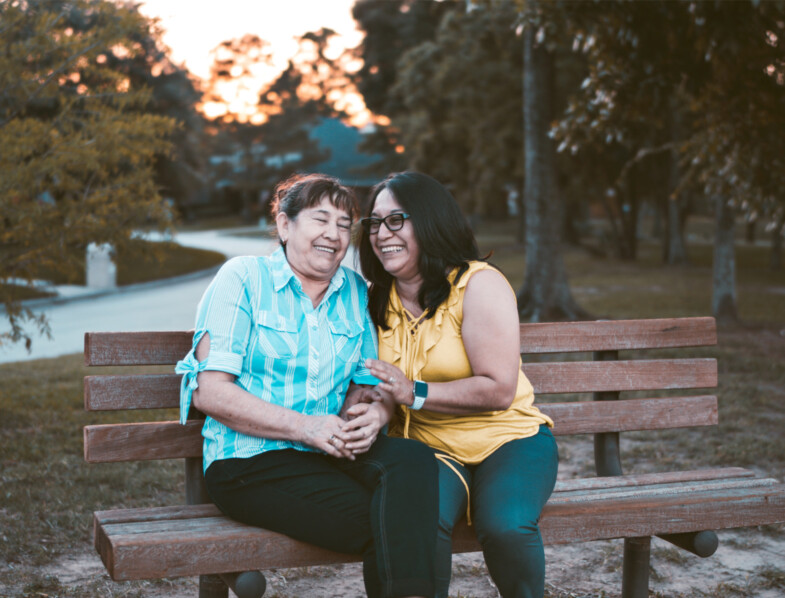It can be an anxious time when someone you love and care about is diagnosed with cancer. A carer, or caregiver, is someone who provides unpaid care and support to someone with a disability, ageing, or cancer.
The following information will help you find out more about being a carer to someone diagnosed with cancer.
Assisting with their medical care
Carers often help with medical care. Your role as a carer may include helping the person communicate with their health care team, making decisions about their care or speaking on behalf of them.
The person you are caring for needs to give written consent for the treating team to talk with you about their care. Talking to health professionals may feel overwhelming if it is new to you. Some ways to make this easier include:
- Having a regular general practitioner (GP) who can help you.
- Writing down a list of questions before your appointment.
- Keeping a notebook for appointment notes, so that you can review, following the appointment. Write down a list of the medications, whether prescribed by a doctor, or over the counter, such as vitamins.
- Keeping a record of all treatments and test results.
- Setting up a system to organise paperwork, such as a filing cabinet.
- Setting the person up with an online My Health Record to store important health information.
- Applying for a PBS Safety Net card to reduce the cost of medicine (if applicable).
Providing practical support
As a carer you may help provide practical support, such as:
- Cooking
- Household chores
- Driving the person to medical appointments
- Making the house safe
- Helping with personal care
There are many support services available to help you. Don’t be afraid to ask for help.
Preparing meals:
- Treatment can weaken the person’s immune system, so make sure to follow good hygiene and safe food practices. Always wash your hands before preparing food.
- You may notice the person you are caring for having difficulty eating, problems with swallowing or chewing, and their appetite may decrease. Talk with their treatment team if you’re worried about weight loss.
- If family and friends offer to help, let them know what types of food to prepare.
- For more information, read our nutrition tips for people living with cancer.
Managing the home:
- You may need to make some changes at home to make it safer for them to carry out their everyday tasks. Speak to an occupational therapist or physiotherapist about household aids and equipment.
- You may need to take on other responsibilities such as housework, gardening, shopping and looking after pets.
- A social worker may be able to arrange help with housework or gardening. Ask to see the social worker at the hospital where the person you are caring for attends treatment.
- Caring for someone with cancer may cause financial distress. You may be able to receive government benefits. Seek professional help from a financial planner or financial counsellor.
For more information read our caring for someone with cancer booklet.
Providing emotional support
An important part of your role as a carer may be to provide emotional support to the person with cancer you are caring for.
Many people may be concerned about talking to the person they care for about their diagnosis. You may be worried about saying the wrong thing or not knowing how to respond. Remember that letting someone know you are there to listen to them is more important than having the ‘right’ answers.
Talking to someone with cancer:
- Sit somewhere quiet and private.
- Allow them to talk without interrupting them or changing the subject.
- Wait to be asked before giving advice.
- Acknowledge that this is a difficult time.
- Try to avoid comparing their journey to other people’s situations.
- Encourage them to also speak to family members, friends, health professionals or a cancer support group for additional emotional support
- Respect their decision if they don’t want to share their thoughts.
See our article on tips for talking to someone with cancer for more information.
Caring for yourself
The experience of being a carer is different for everyone – it can bring a sense of satisfaction, but it can also be challenging and stressful. It’s important to remember to look after yourself and acknowledge if you are not feeling okay.
Managing your emotions:
- Take time for yourself.
- Talk to family and friends about how you’re feeling.
- Speak to your GP if you feel you’re not coping.
- Be kind to yourself.
- Be active.
- Join a support group.
Our Cancer Information and Support Line is available for anyone affected by cancer, including carers. You can call 13 11 20 to speak to a cancer nurse.
Remember you don’t have to do it all
There are a range of resources available to support you as a carer. We have listed a few of these below:
- Carer Gateway: information on local support services for carers and other support that may suit your needs – call 1800 422 737 or visit carergateway.gov.au.
- Your local council or social worker: They can put you in touch with services for help at home (such as house cleaning, meals or shopping). Social work services are also available through Services Australia – visit servicesaustralia.gov.au.
- My Aged Care: If the person you are caring for is 65 or over (50 and over for Aboriginal and Torres Strait Islander peoples), contact My Aged Care for an assessment – call 1800 200 422 or visit myagedcare.gov.au.
- Cancer Council’s 13 11 20 Information and Support Line: Available for anyone affected by cancer, including carers. Speak to a cancer nurse for information and support on any cancer-related concern – call 13 11 20.
